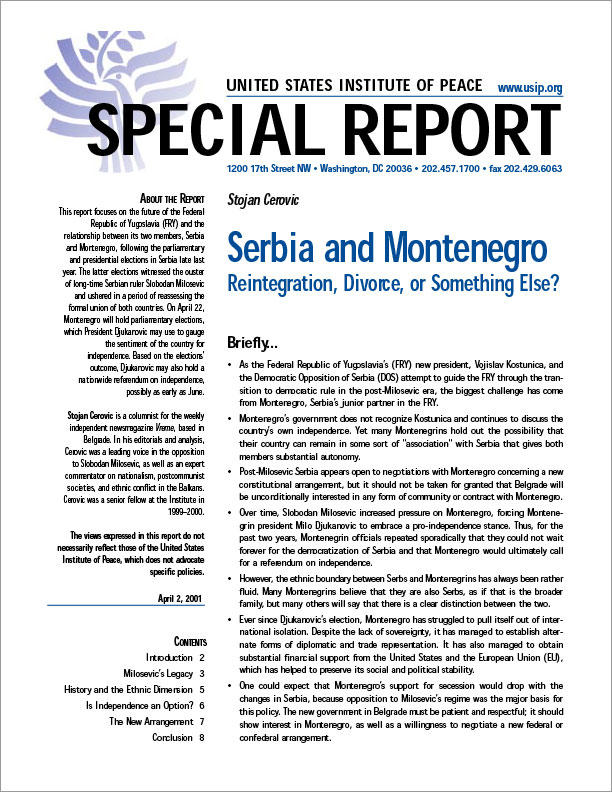
Summary
- As the Federal Republic of Yugoslavia's (FRY) new president, Vojislav Kostunica, and the Democratic Opposition of Serbia (DOS) attempt to guide the FRY through the transition to democratic rule in the post-Milosevic era, the biggest challenge has come from Montenegro, Serbia's junior partner in the FRY.
- Montenegro's government does not recognize Kostunica and continues to discuss the country's own independence. Yet many Montenegrins hold out the possibility that their country can remain in some sort of "association" with Serbia that gives both members substantial autonomy.
- Post-Milosevic Serbia appears open to negotiations with Montenegro concerning a new constitutional arrangement, but it should not be taken for granted that Belgrade will be unconditionally interested in any form of community or contract with Montenegro.
- Over time, Slobodan Milosevic increased pressure on Montenegro, forcing Montenegrin president Milo Djukanovic to embrace a pro-independence stance. Thus, for the past two years, Montenegrin officials repeated sporadically that they could not wait forever for the democratization of Serbia and that Montenegro would ultimately call for a referendum on independence.
- However, the ethnic boundary between Serbs and Montenegrins has always been rather fluid. Many Montenegrins believe that they are also Serbs, as if that is the broader family, but many others will say that there is a clear distinction between the two.
- Ever since Djukanovic's election, Montenegro has struggled to pull itself out of international isolation. Despite the lack of sovereignty, it has managed to establish alternate forms of diplomatic and trade representation. It has also managed to obtain substantial financial support from the United States and the European Union (EU), which has helped to preserve its social and political stability.
- One could expect that Montenegro's support for secession would drop with the changes in Serbia, because opposition to Milosevic's regime was the major basis for this policy. The new government in Belgrade must be patient and respectful; it should show interest in Montenegro, as well as a willingness to negotiate a new federal or confederal arrangement.
- The Montenegrin government recently announced its intention to call for a referendum, possibly in June. It plans to offer its constituents a choice between independence and some alternative political arrangement with Serbia expected to be agreed upon by that time.
- But differences over the issue have become sharper and much more resonant since the split in Montenegro's ruling coalition: the Social Democratic Party is pushing for independence; the People's Party, which now sits in opposition to Djukanovic's minority government, is urging the re-establishment of closer links with Serbia. Above all, though, Belgrade should not exploit Djukanovic's political difficulties.
- Montenegro might be left alone to decide about its future and about its viability as an independent state, but if the international community were to condone such a divorce, would it serve as a negative example for the reintegration of Bosnia? The unresolved status of Kosovo would also become far more complicated because one of the options for Kosovo is to become the third republic in a new Yugoslav federation.
About the Report
This report focuses on the future of the Federal Republic of Yugoslavia (FRY) and the relationship between its two members, Serbia and Montenegro, following the parliamentary and presidential elections in Serbia late last year. The latter elections witnessed the ouster of long-time Serbian ruler Slobodan Milosevic and ushered in a period of reassessing the formal union of both countries. On April 22, Montenegro will hold parliamentary elections, which President Djukanovic may use to gauge the sentiment of the country for independence. Based on the elections' outcome, Djukanovic may also hold a nationwide referendum on independence, possibly as early as June.
Stojan Cerovic is a columnist for the weekly independent newsmagazine Vreme, based in Belgrade. In his editorials and analysis, Cerovic was a leading voice in the opposition to Slobodan Milosevic, as well as an expert commentator on nationalism, postcommunist societies, and ethnic conflict in the Balkans. Cerovic was a senior fellow at the Institute in 1999-2000.
The views expressed in this report do not necessarily reflect those of the United States Institute of Peace, which does not advocate specific policies.